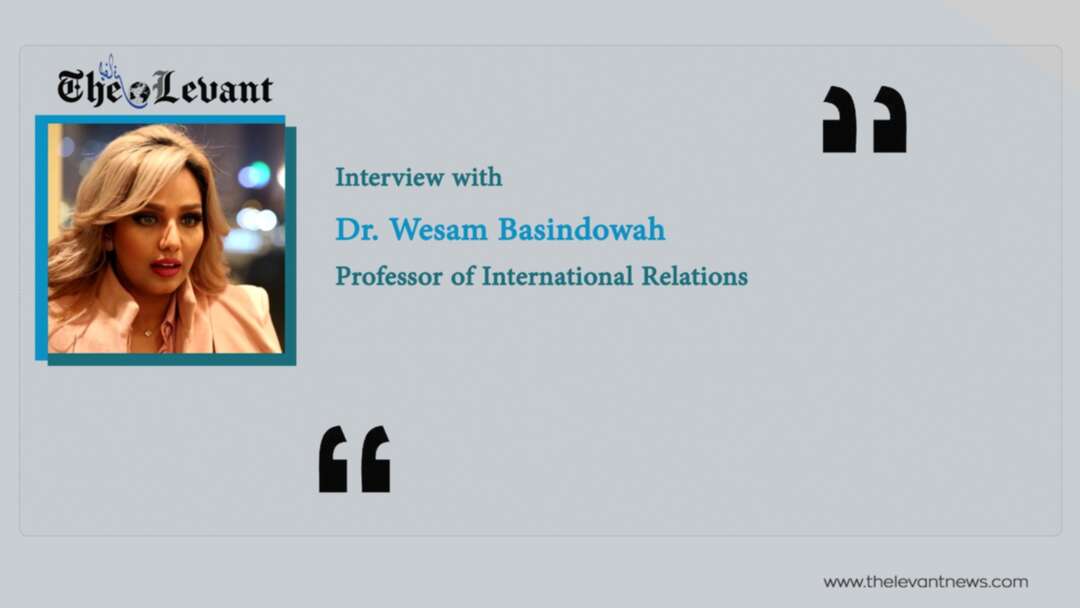-
Interview with Dr. Wesam Basindowah , Professor of International Relations

Levant News – London
How do you evaluate the role of the coalition led by Saudi Arabia and the UAE in Yemen?
First of all, I would like to mention that the Yemeni people and even the elites are counting a lot after Allah Almighty on the Saudi guarantor under his wise leadership.
What has emerged from the Saudi approach since the first day of the crisis shows that His Majesty the King and his Crown Prince and Deputy Minister of Defense and the high guidance of Saudi diplomacy that any internal side conflict between the Yemenis is a red line, and that the Kingdom and its leadership are doing everything in order to restore stability and construction and stabilize security in Yemen.
This will be the next stage in the field of construction and reconstruction through the Saudi program for the rebuilding of Yemen as it has always been, in addition to harnessing the economic, diplomatic, and political tools of Saudi Arabia to facilitate everything that would bring peace to Yemen.
The speech of His Highness Crown Prince Mohammed bin Salman at the signing ceremony of the Riyadh agreement was a secure, specific, and brief, containing many messages that summarized all stages of the historical relationship and the organic link between the Kingdom and Yemen, and then the Saudi role in addressing the attempts to take over of the Yemeni state and attempts to spread strife and discrimination and fighting Internal, right up to the future vision reflected in what he said at the end of the speech.
He said that this agreement will be the gateway to a comprehensive cooperation between the various Yemeni political components, that such an approach enhances the confidence of the Yemenis that the guarantor of the agreement this time is different and therefore can actually achieve the goal, and that the new government will be able to meet the challenges as the country and people and the situation can no longer tolerate more.
Riyadh Agreement: Will the Riyadh Agreement succeed in ending the war in Yemen?
Although previous governments were mindful that their ministers were from different northern and southern regions, the fundamental difference that the Riyadh agreement made in this regard was the recognition that they had entered the government as southerners.
This is an acknowledgment of the establishment of identity, and the elimination of the idea that there are attempts to obliterate and dissolve and so on, especially since the southerners are very sensitive to their identity, which is natural as a result of past experience.
Also, the idea of taking into account the diversity in the ministries of both sections, both north and south, so as to give representation to the various political forces and components. And the composition of the ministries of the competent, who have experience and competence in the ministries they will assume.
What are the demands and role of women at this stage?
Emphasis should be placed on the role of women in this formation. According to the outcome of the national dialogue, women's representation should not be less than one-third. One-third is the minimum, which has not been achieved in the various governments formed since the coup.
Of our meetings, we women, our future demands include not less than fifty percent, including two sovereign ministries. The third that was not fulfilled was our demand several years ago from 2011 to 2014 and today we are at the gates of 2020, the world around us is changing concerning female representation.
Arab countries around us, like Lebanon, assigned the Ministry of Interior to a woman, and Sudan, where women were flogged if they wear pants, today women in Sudan preside over the Supreme Court of Justice and foreign and higher education and others.
And the Yemeni woman is no less capable, throughout this period, they have proved their competence, experience, and ability and have topped many ranks even before men in peace and war. Yemeni women historically and now have been the forefront in the world and their civilizations in Yemen are still witness.
It is not about the competition of women with men, but the inherent right of women to take their chance in partnership in building the country according to competence,
In 2020, the world will celebrate the 20th anniversary of the adoption of UN Resolution 1325, which calls on States to ensure the equal representation of women in decision-making and all peace consultations,
Also, that at least half of the female representation should be from outside the parties, contrary to the usual practice by selecting a limited number of women from certain parties, assigning limited ministries as mere decorative patchwork, and ignoring independent women and civil society.
Here we count heavily on the response of His Excellency President Hadi, whose vision really starts from supporting women. Efficiency and capacity are the tests of all candidates, men, and women, and the consumed faces that people have lost faith in must change.
What are the criteria for the success of the next government?
The adoption of the criteria of diversity and efficiency will prepare the government for the next stage, which is mined and challenged.
The people rely on it a lot in controlling security, restoring services, building and reconstruction, and above all that restoring the state and its image, which is the basis if we restore the image of the country we will gain the confidence of the citizen, especially since the Yemeni people are people with deep historical roots in civilization, known as politicized people.
Is it possible to implement the Riyadh agreement on the ground? What are the conditions to ensure its success?
Yes, we can implement this agreement on the ground with sincere intentions and serious work.
It seems through my recent meetings with the various political forces and elites on the sidelines and in the scenes of the agreement ceremony that everyone is optimistic and really willing to implement it, and everybody is exhausted and sick of war.
Moreover, the indicators and meetings that took place between President Hadi, the President of the Transitional Council and his delegation made clear that there are the real desire and sincere intention to transcend the wounds and political disagreement and proceed to respond to the needs of the people and their voices and the necessities of the phase.
You May Also Like
Popular Posts
Caricature
BENEFIT Sponsors BuildHer...
- April 23, 2025
BENEFIT, the Kingdom’s innovator and leading company in Fintech and electronic financial transactions service, has sponsored the BuildHer CityHack 2025 Hackathon, a two-day event spearheaded by the College of Engineering and Technology at the Royal University for Women (RUW).
Aimed at secondary school students, the event brought together a distinguished group of academic professionals and technology experts to mentor and inspire young participants.
More than 100 high school students from across the Kingdom of Bahrain took part in the hackathon, which featured an intensive programme of training workshops and hands-on sessions. These activities were tailored to enhance participants’ critical thinking, collaborative problem-solving, and team-building capabilities, while also encouraging the development of practical and sustainable solutions to contemporary challenges using modern technological tools.
BENEFIT’s Chief Executive Mr. Abdulwahed AlJanahi, commented: “Our support for this educational hackathon reflects our long-term strategic vision to nurture the talents of emerging national youth and empower the next generation of accomplished female leaders in technology. By fostering creativity and innovation, we aim to contribute meaningfully to Bahrain’s comprehensive development goals and align with the aspirations outlined in the Kingdom’s Vision 2030—an ambition in which BENEFIT plays a central role.”
Professor Riyadh Yousif Hamzah, President of the Royal University for Women, commented: “This initiative reflects our commitment to advancing women in STEM fields. We're cultivating a generation of creative, solution-driven female leaders who will drive national development. Our partnership with BENEFIT exemplifies the powerful synergy between academia and private sector in supporting educational innovation.”
Hanan Abdulla Hasan, Senior Manager, PR & Communication at BENEFIT, said: “We are honoured to collaborate with RUW in supporting this remarkable technology-focused event. It highlights our commitment to social responsibility, and our ongoing efforts to enhance the digital and innovation capabilities of young Bahraini women and foster their ability to harness technological tools in the service of a smarter, more sustainable future.”
For his part, Dr. Humam ElAgha, Acting Dean of the College of Engineering and Technology at the University, said: “BuildHer CityHack 2025 embodies our hands-on approach to education. By tackling real-world problems through creative thinking and sustainable solutions, we're preparing women to thrive in the knowledge economy – a cornerstone of the University's vision.”
opinion
Report
ads
Newsletter
Subscribe to our mailing list to get the new updates!






















